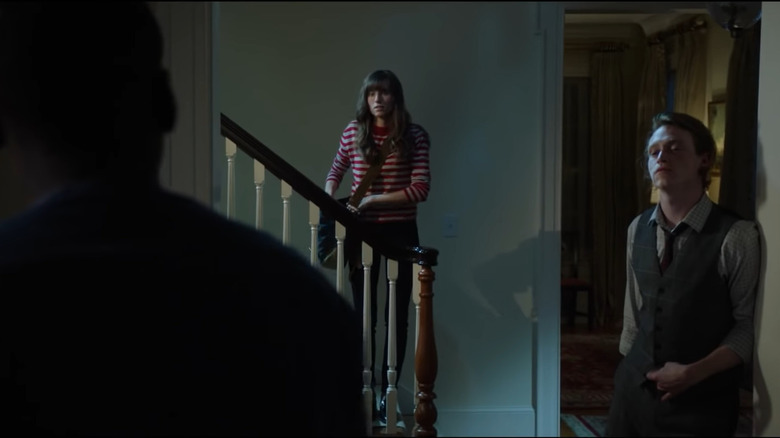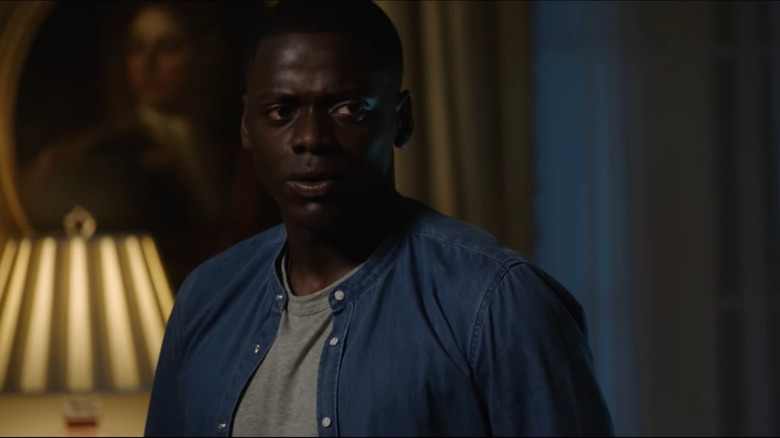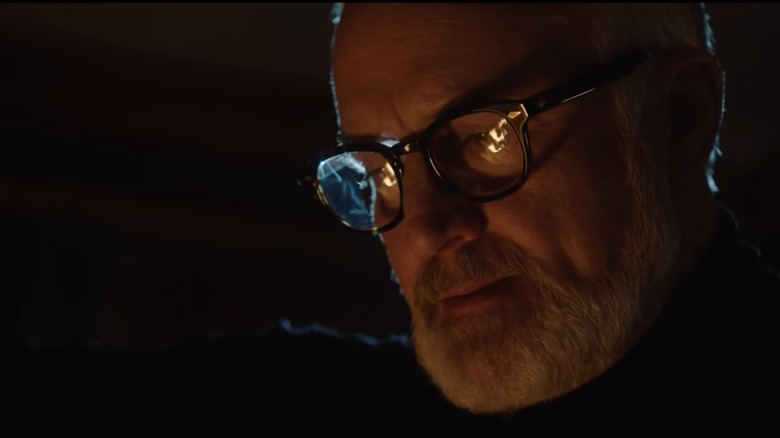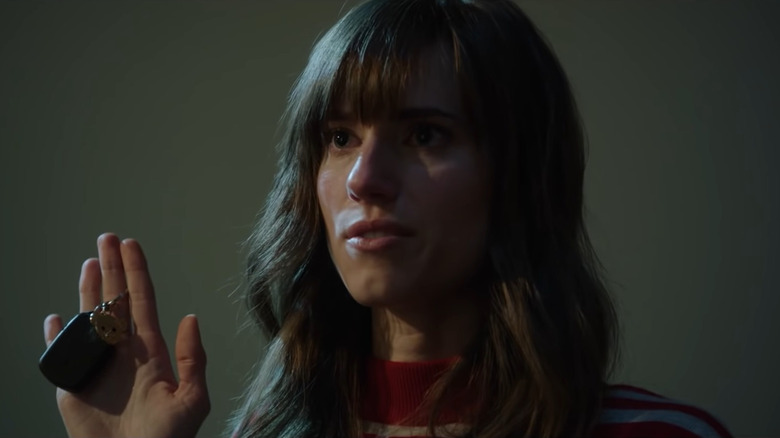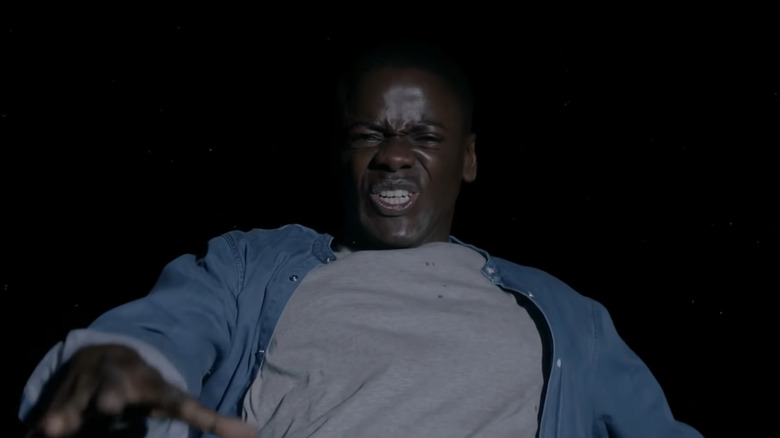Breaking Down The Best Scene In Get Out
Jordan Peele's debut horror film, "Get Out," is one of the most tightly paced, smartly written horror films ever made. The film follows Chris (Daniel Kaluuya), a young Black man visiting his white girlfriend Rose's (Allison Williams) family for the weekend. Although the family is outwardly welcoming, their weird racial remarks toward him and their overall strangeness stop seeming like nervous white liberal overcompensation, but something much darker. Through the first half of the film, Chris becomes increasingly suspicious.
The only person in the house he trusts is Rose, who consistently comes across as the only white person in the film capable of treating Chris normally. She defends Chris in the beginning of the film when a police officer needlessly asks to see his ID, and in multiple points throughout the first act she's so annoyed at the way her family talks to Chris that he is the one having to calm her down.
In so many films that touch upon American racism, there is very often the One Good White Person thrown in, put there on some level to avoid making white audiences feel too uncomfortable. (It's a step down from the white savior trope, but often still troublesome.) Even movies set around enslaved people and slave owners often have a white person who understands slavery is wrong, allowing white viewers to reassure themselves that if they were alive in those times, that's the type of person they'd be. Throughout the first 70 minutes of "Get Out," Rose seems to serve as that kind of character, the sole white person who isn't obviously racist. That is, until Chris comes across a bunch of pictures of Rose with a string of her former lovers, every single one of them Black, the last couple belonging to the strange servants working at the house.
'Where are those keys, Rose?'
There was never a version of the movie where Rose was innocent, but early drafts played around with the idea of letting the audience know Rose was evil from the beginning. "There was an iteration of it where ... we as an audience were meant to know that she was in on it the whole time," Jordan Peele told Slate, but ultimately they decided to let the audience figure out her involvement at the same time Chris does.
However, Chris doesn't completely abandon Rose as soon as he finds the pictures. Instead he tries to leave the house with her, pretending he doesn't suspect a thing. Part of this is simple strategy, and the other part is a desire for Rose not to be what all the signs are now pointing toward. As Peele explained:
"If there's a possibility that they don't know that he knows what he knows or that Rose doesn't, that if he just plays it cool, he can get out of the house without alerting them to the fact and getting a head start. ... I think there's a little bit of doubt in his head, or at least he's hoping there's something he's not thinking of. Maybe [Rose] was hypnotized by her mother, maybe these are all just past boyfriends of hers and she didn't tell him because she didn't want him to know."
This ultimately culminates in the best moment in the movie, where Chris is trying to leave the house but Rose stays on the staircase, apparently struggling to find the keys in her purse. "Rose, the keys?" Chris says early in the scene, still trying to be polite. Kaluuya's acting is terrific here; you can see how much effort it's taking Chris to stay composed, to pretend like everything's normal. Rose reassures him she's looking for them, but a solid minute and a half later, she's still trying to find them. (It feels so much longer than just 90 seconds.)
Everyone's pretending
The idea that it would take Rose this long to find her keys is hard to swallow, but Rose almost makes it believable by pretending to be freaking out. "What the f*** is going on?" she cries in frustration, still playing the part of an innocent person who's just as confused and scared as Chris. What's particularly creepy about the scene is if it weren't for the 70 minutes of context preceding it, we might be tempted to feel bad for her. The movie takes what on the surface seems like a scared person having a panic attack so severe she can't manage to perform a simple task, and juxtaposes it with our eventual knowledge that she's faking it.
Part of what makes the scene so effective is everyone in the room knows what's happening, but they're pretending as if they don't. Chris is acting like he simply has to leave because his dog got sick; Rose is acting like a supportive girlfriend who simply can't find the keys; the rest of Rose's family is acting as if they don't notice Chris is scared, that they have no problem with him leaving. The only one not pretending is Dean Armitage (Bradley Whitford), who gives the world's creepiest monologue. "Even the sun will die someday," he says, "but we are divine. We are the gods trapped in cocoons." It's not a full mask-off moment, but it shows these people are no longer keeping up the friendly façade they've been maintaining this whole weekend. That they're not trying too hard to console Chris is perhaps even scarier at this point than if they were, because it shows how confident they are that Chris won't be able to escape.
Finally, the real gut-punch of the scene hits us: Chris, having accepted that Rose is full of it, asks her in a defeated voice, "Where's the keys?" Her scared expression disappears, and she calmly shows them in her hand. "You know I can't give you the keys, right, babe?"
Subverting the white damsel trope
Three years after "Get Out" came out, a video went viral of a white woman named Amy Cooper calling the cops on the Black man who asked her to put her dog on a leash. Of all the disturbing aspects of the clip, one of the worst is the realization that if we weren't seeing with our own eyes that she wasn't in any danger whatsoever, her calls for help might sound believable. The fear in her voice feels real, which makes what she's doing all the more revolting. She's taking advantage of the long-documented trope of the white damsel in distress. It's been reflected in movies since pretty much the moment they started making them, and it's one that's certainly present in the horror genre in particular. As culture critic Aisha Harris put it:
"The Final Girl is almost always a white woman (and usually a brunette) who manages to defeat the monster and save herself. She is often young and virginal and definitely not a mean girl. We're supposed to identify with her and wish for her victory. She is who Allison Williams would play if this were a typical slasher film made by a typically white filmmaker — but this is not, and it was not. She is the villain, an exact incarnation of the horror of being a Black person in America."
This is part of why Rose's façade as a well-meaning person who is somehow taken by surprise about her evil, racist family is so tempting to believe. Williams effectively captures the tone of a scared, pitiable woman before switching effortlessly into the clearly capable, cold-hearted Rose seen throughout the final third of the film. The feigned helplessness in her voice in this scene is so similar to the tone Cooper would use years later, and what plenty of other Amy Coopers have used throughout history — she's using her white tears to make herself seem like an innocent victim. She's taking what made the Final Girl trope so popular in the first place and weaponizing it against Chris.
The point of no return
This is part of why Chris stays by her, even as he's smart enough to figure out that she's in on the plan. Jordan Peele explained:
"As the scene progresses and she can't deliver those keys, he knows in his heart of hearts that it's not right. And the only thing that by the end is pushing Chris to continue to fight for those keys, it becomes less about the keys and more about communicating, 'I trusted you, you betrayed me, and now's the time to be real for once. So where are those keys?' He's resigned and the keys kind of became a metaphor by the end. His tragic flaw and his sin that he's been dealing with this entire movie is that when he was a child he felt like he abandoned his mother when she was in need. So this character isn't going to just run without knowing for certain that he doesn't have any family here."
Even as he knows Rose has been hiding something huge from him, even as it becomes clear she's putting on a performance for him, Chris doesn't just run out the door in this scene because there's still a chance that maybe Rose hasn't betrayed him. Even as his instincts tell him to run, there's still a part of him hoping there's some detail he missed that exonerates her, that he isn't entirely alone in this situation.
But as Missy (Catherine Keener) sends him into the Sunken Place, we've finally accepted along with Chris that he truly is on his own here. His one ally in the house has been against him the whole time, and the family has now effortlessly taken complete control over his body. It's still not entirely clear what they're going to do to him, but the absolute dread the scene creates is overpowering. Every good horror movie needs a moment where all hope seems lost, where simply walking away is no longer an option. It's with this scene that "Get Out" pulls off that moment — and makes it look easy.
